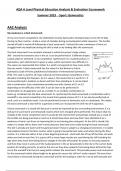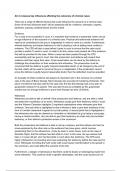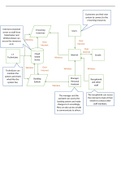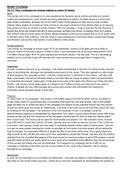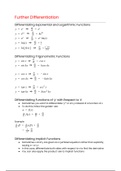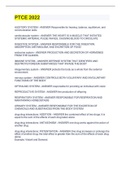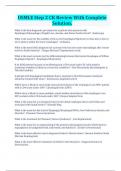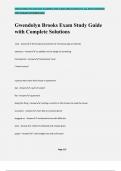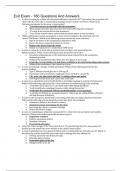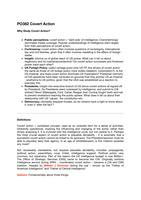Who is Sovereign?
In the USA, this question is easy… The written constitution tells us that ‘We the People’ are sovereign.
It is a proposition too plain to be contested, that the constitution controls any legislative act repugnant to it; or, that the
legislature may alter the constitution by an ordinary act. Between these alternative there is no middle ground. The
constitution is either a superior paramount law, unchangeable by ordinary means, or it is on a level with ordinary
legislative acts, and, like other acts, is alterable when the legislature shall please to alter it. If the former part of the
alternative be true, then a legislative act contrary to the constitution is not law: if the latter part be true, then written
constitutions are absurd attempts, on the part of the people, to limit a power in its own nature illimitable.
- Chief Justice Marshall, Marbury v Madison (1803) 1 Cranch 137, 176.
The UK
Lacks a written constitution…
Unsurprisingly, this means we need to search hard for the rule, the justification of the rule and the
“exceptions/challenges” to the rule…
This is a difficult area of the constitution;
Ultimately about the location of power in the constitution.
Links to separation of power and rule of law
Political Sovereignty
The word ‘sovereignty’ is sometimes employed in a political rather than in a strictly legal sense. That body is ‘politically
sovereign or supreme in a state the will fo which is ultimately obeyed … in this sense of the word the electors of Great
Britain maybe said to be … the body in which sovereign power is vested … But this is a political, not a legal fact… The
political sense of the word ‘sovereignty’ is, it is true, fully as important as the legal sense or more so. But the two
significations … are essentially different.
- AV Dicey, Introduction to the Study of the Constitution
Legal Sovereignty
The state of Monarchy is the supremest thing upon earth; for kings are not only God’s lieutenants upon earth and sit
upon God’s throne, but even by God himself they are called gods. … Kings are justly called gods for that they exercise a
manner or resemblance of Divine power upon earth; … they make and unmake their subject; they have power of raising
and casting down; of life and death; judges over all their subjects and in all causes, and yet accomptable to none but
God only…
- James I, Speech to Parliament, 21 March 1610.
Cases of proclamations (1610)
King James I claimed the power to legislate by proclamation, ‘to prohibit new buildings in and about London… [and to]
prohibit the making of starch of wheat’.
Coke CJ
“[T]he King by his proclamation or other ways cannot change any part of the common law, or statute law, or the
customs of the realm … also the King cannot create any offence by his prohibition or proclamation, which was not an
offence before, for that was to change the law, and to make an offence which was not; … also … the King hath no
prerogative, but that which the law of the land allows him"
Bates’s case (case of imposition 1606)
Bates refused to pay an import duty that was imposed by James I without the approval of Parliament.
The duty was held valid by the courts.
Meant the King had the power to introduce and impose his own taxes
, Dr Bonham's Case(1609) 8 Co. REP 114
Bonham was practicing medicine in London without the required licence. He was fined and arrested.
Bonham refused to pay the fine, arguing that the London College of Physicians had no authority to arrest him and fine
him. Parliament had created the body through a Statute of Incorporation. Bonham argued that they were acting
unfairly.
The Court found in favour of Bonham.
Coke CJ
"[I]t appears in our books, that in many cases, the common law will control Acts of Parliament, and sometimes adjudge
them to be utterly void: for when an Act of Parliament is against common right and reason, or repugnant, or impossible
to be performed, the common law will control it, and adjudge such Act to be void”.
Battle between Crown and Parliament Continued
Civil War,
Oliver Cromwell: Parliamentarians; Roundheads
Charles I: Royalists; Cavillers
The glorious Revolution, 1688
James II was hated by the protestants, he was too aggressively pro-Catholic.
Appointing Catholics into senior government positions.
The throne was seized by William of Orange, with his wife Mary, who was James II’s daughter.
William and Mary took the throne on terms agreed by Parliament, meaning that they accepted the authority of
Parliament over the Crown.
The Bill of Rights (1688)
Established Parliament’s rights against the Crown;
Restricted the exercise of the Monarch’s power;
Expression of Parliament’s effective supremacy in law.
Dispensing Power - the Crown can no longer suspend or dispense with particular laws.
Taxation - Parliament’s consent is needed to levy taxation.
Army - Raising or keeping a standing Army needs the consent of Parliament.
Parliamentary Privilege - “that the Freedom of Speech and Debates or proceedings in Parliament ought not to be
impeached or questioned in any Court or Place out of Parliament”.
Whatever the queen in parliament enacts is law
All rules of law have historical sources. As a matter of fact and history they have their origin somewhere, though we may
not know what it is. But not all of them have legal sources… But whence comes the rule that Acts of Parliament have the
force of law? This is legally ultimate; its source is historical only, not legal… It is the law because it is the law, and for no
other reason that it is possible for the law itself to take notice of. No statute can confer this power upon Parliament, for
this would be to assume and act on the very power that is to be conferred.”
- Salmond
Historical Rule.. two very hard questions… to think about
“if legislative sovereignty came about through a historical process, rather than from a ‘big bang’ creation of a
fundamental rule … has constitutional evolution in this area come to a full stop?”
Anthony Bradley, ‘The Sovereignty of Parliament - Form or Substance’
Or, if acceptance of this rule is on the basis of more fundamental principles?
Moral or political?
What if legislation made by Parliament does not meet these principles?
In the USA, this question is easy… The written constitution tells us that ‘We the People’ are sovereign.
It is a proposition too plain to be contested, that the constitution controls any legislative act repugnant to it; or, that the
legislature may alter the constitution by an ordinary act. Between these alternative there is no middle ground. The
constitution is either a superior paramount law, unchangeable by ordinary means, or it is on a level with ordinary
legislative acts, and, like other acts, is alterable when the legislature shall please to alter it. If the former part of the
alternative be true, then a legislative act contrary to the constitution is not law: if the latter part be true, then written
constitutions are absurd attempts, on the part of the people, to limit a power in its own nature illimitable.
- Chief Justice Marshall, Marbury v Madison (1803) 1 Cranch 137, 176.
The UK
Lacks a written constitution…
Unsurprisingly, this means we need to search hard for the rule, the justification of the rule and the
“exceptions/challenges” to the rule…
This is a difficult area of the constitution;
Ultimately about the location of power in the constitution.
Links to separation of power and rule of law
Political Sovereignty
The word ‘sovereignty’ is sometimes employed in a political rather than in a strictly legal sense. That body is ‘politically
sovereign or supreme in a state the will fo which is ultimately obeyed … in this sense of the word the electors of Great
Britain maybe said to be … the body in which sovereign power is vested … But this is a political, not a legal fact… The
political sense of the word ‘sovereignty’ is, it is true, fully as important as the legal sense or more so. But the two
significations … are essentially different.
- AV Dicey, Introduction to the Study of the Constitution
Legal Sovereignty
The state of Monarchy is the supremest thing upon earth; for kings are not only God’s lieutenants upon earth and sit
upon God’s throne, but even by God himself they are called gods. … Kings are justly called gods for that they exercise a
manner or resemblance of Divine power upon earth; … they make and unmake their subject; they have power of raising
and casting down; of life and death; judges over all their subjects and in all causes, and yet accomptable to none but
God only…
- James I, Speech to Parliament, 21 March 1610.
Cases of proclamations (1610)
King James I claimed the power to legislate by proclamation, ‘to prohibit new buildings in and about London… [and to]
prohibit the making of starch of wheat’.
Coke CJ
“[T]he King by his proclamation or other ways cannot change any part of the common law, or statute law, or the
customs of the realm … also the King cannot create any offence by his prohibition or proclamation, which was not an
offence before, for that was to change the law, and to make an offence which was not; … also … the King hath no
prerogative, but that which the law of the land allows him"
Bates’s case (case of imposition 1606)
Bates refused to pay an import duty that was imposed by James I without the approval of Parliament.
The duty was held valid by the courts.
Meant the King had the power to introduce and impose his own taxes
, Dr Bonham's Case(1609) 8 Co. REP 114
Bonham was practicing medicine in London without the required licence. He was fined and arrested.
Bonham refused to pay the fine, arguing that the London College of Physicians had no authority to arrest him and fine
him. Parliament had created the body through a Statute of Incorporation. Bonham argued that they were acting
unfairly.
The Court found in favour of Bonham.
Coke CJ
"[I]t appears in our books, that in many cases, the common law will control Acts of Parliament, and sometimes adjudge
them to be utterly void: for when an Act of Parliament is against common right and reason, or repugnant, or impossible
to be performed, the common law will control it, and adjudge such Act to be void”.
Battle between Crown and Parliament Continued
Civil War,
Oliver Cromwell: Parliamentarians; Roundheads
Charles I: Royalists; Cavillers
The glorious Revolution, 1688
James II was hated by the protestants, he was too aggressively pro-Catholic.
Appointing Catholics into senior government positions.
The throne was seized by William of Orange, with his wife Mary, who was James II’s daughter.
William and Mary took the throne on terms agreed by Parliament, meaning that they accepted the authority of
Parliament over the Crown.
The Bill of Rights (1688)
Established Parliament’s rights against the Crown;
Restricted the exercise of the Monarch’s power;
Expression of Parliament’s effective supremacy in law.
Dispensing Power - the Crown can no longer suspend or dispense with particular laws.
Taxation - Parliament’s consent is needed to levy taxation.
Army - Raising or keeping a standing Army needs the consent of Parliament.
Parliamentary Privilege - “that the Freedom of Speech and Debates or proceedings in Parliament ought not to be
impeached or questioned in any Court or Place out of Parliament”.
Whatever the queen in parliament enacts is law
All rules of law have historical sources. As a matter of fact and history they have their origin somewhere, though we may
not know what it is. But not all of them have legal sources… But whence comes the rule that Acts of Parliament have the
force of law? This is legally ultimate; its source is historical only, not legal… It is the law because it is the law, and for no
other reason that it is possible for the law itself to take notice of. No statute can confer this power upon Parliament, for
this would be to assume and act on the very power that is to be conferred.”
- Salmond
Historical Rule.. two very hard questions… to think about
“if legislative sovereignty came about through a historical process, rather than from a ‘big bang’ creation of a
fundamental rule … has constitutional evolution in this area come to a full stop?”
Anthony Bradley, ‘The Sovereignty of Parliament - Form or Substance’
Or, if acceptance of this rule is on the basis of more fundamental principles?
Moral or political?
What if legislation made by Parliament does not meet these principles?

